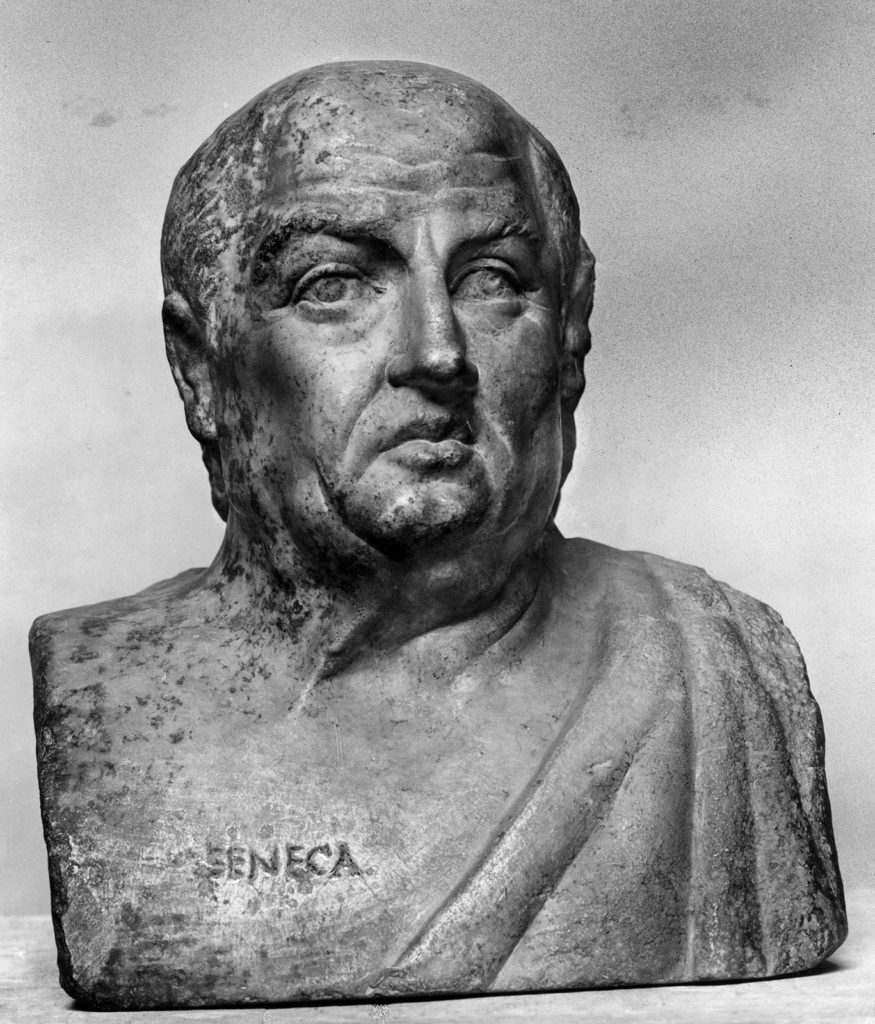
When last heard from, Lucius Annaeus Seneca was complaining about the gym rats who worked out noisily in the baths beneath his apartment. Two thousand years later and it doesn’t appear the issue has gone away.
Seneca, a philosopher and onetime tutor to the emperor Nero, thought about lots of things besides grunting showoffs, of course. Sometimes he thought too much, winding up in cul-de-sacs of logic without much to show for his gruntworthy mental exercises.
But he also had some marvelous insights, many of which have inspired thinkers from the Renaissance to today, including the rather memorable “There is nothing to fear in your affairs but fear itself.” He could also be witty, despite a thread of priggishness that occasionally comes through, as in, for example, his condemnations of the baths.
But here are 41 of the best one (and two) liners from his Letters on Ethics:
- I don’t consider it an interesting question whether hammers came into use before tongs.
- Philosophy demands self-restraint, not self-abnegation—and even self-restraint can comb its hair.
- Inability is just an excuse; the real reason is unwillingness.
- Don’t be miserable before it is time.
- When troubles come is time enough to bear them.
- What could be more senseless than suffering over what has not yet happened? Rather than awaiting future trials, you are summoning them to your side!
- Whenever the situation remains uncertain, do yourself a favor and give credence to the thing you prefer.
- Where hope goes, fear follows. Both belong to the mind that is in suspense, that is worried by its expectation of what is to come.
- No one is happy who does not believe himself to be.
- Each person is as wretched as he believes himself to be.
- Being considered superior is just as harmful as being despised.
- Carelessness can look like good nature, and temerity like courage.
- Nature does not bestow virtue: becoming good is a skill.
- No one attains wisdom merely by chance.
- There are many whose faults go undetected only because they are ineffectual.
- There is a great difference between refusing to do wrong and not knowing how to do it.
- Falsehood is inherently unbounded.
- With a ruler, you do not ask how pretty it is but how straight it is.
- Suppose a sage is a superb runner: he will win a race by his speed and not by his wisdom.
- The sick person does not go looking for an eloquent doctor, although if the person who has the ability to cure him also happens to be able to speak in a polished manner about the measures to be taken, he considers it a plus.
- The reason you will die is not that you are sick but that you are alive.
- We die every day, for every day some part of life is taken from us. Even when we are still growing, our life is shrinking. Our last hour of existence is not the only time we die but just the only time we finish dying.
- Once reduced to ashes, we are all the same size. Born unequal, we die equal.
- The great consolation about dying, which we are bound by the law of nature to suffer, is that no one has to suffer it twice.
- Expect the best but prepare for the worst.
- The liberal arts themselves do not lead the mind all the way to virtue but do equip it for the journey.
- It’s the height of madness to worry about being despised by the despicable.
- We tend toward the worse, because there’s always someone to lead the way and someone to follow.
- Fortune exempts many from punishment, but none from anxiety.
- “Nothing in excess”; “A greedy mind is never satisfied”; “Expect others to treat you as you treat them.” These sayings give us a jolt, they don’t let anyone doubt them or ask why. That’s how brightly truth shines, even without any reason being given.
- We can be robbed of “having,” but never of “having had.”
- Nothing is more secure than what has already been.
- If you want to escape from your troubles, what you need is not to be in a different place but to be a different person.
- Let us be pleased with each new day as the best that life will give us, and so add it to our store. Life is flying away; we must catch it.”
- We should satisfy our hunger without being particular. Why should it matter what goes into the stomach? It won’t be there long.
- Nature does not care whether the bread is coarse or of the finest flour: Its interest is not in pleasing the stomach but merely in filling it.
- Not wanting is just as good as having.
- The one who has enough has attained the one thing the rich can never get: a stopping point.
- Nothing is serious if one takes it lightly, nothing needs to be annoying, provided that one doesn’t add one’s own annoyance to it.
- Anyone who despises his own life is master of yours.
- Why do you cultivate your appearance? When you have done everything you can, you will still not be as beautiful as animals are.
Quotes are from the University of Chicago Press edition of Seneca’s Letters on Ethics, translated by Margaret Graver and A. A. Long.
